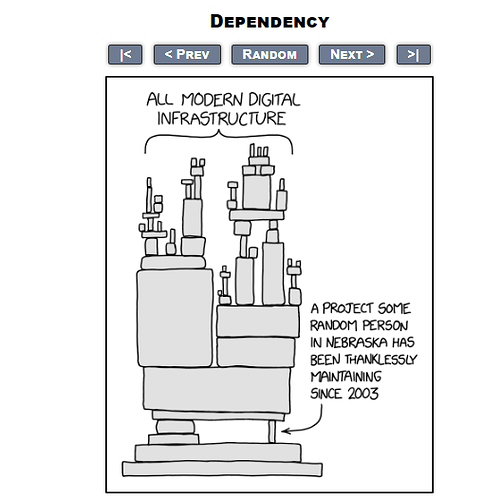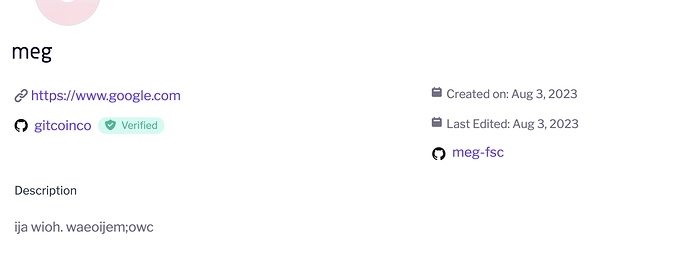Introduction
GG18 is the next iteration of the Gitcoin Program QF rounds that will run on the new decentralized Grants Stack. The planned dates for this round are August 15th to 29th and there will be 4 Core Rounds each with a distinct matching pool:
- Climate Solutions
- Ethereum Infrastructure
- Web3 Community & Education
- Web3 Open Source Software
These are the same core rounds as the Gitcoin Program Beta Round with the exception of ZK Tech. The ZK Tech round was determined to be a better fit as a Featured Round going forward based on the topic scope, number of grantees, and donor turnout from the Beta Round.
There will also be a number of externally operated Featured Rounds that run in this same 2-week window; the topics and details of which are still being determined.
The purpose of this post is to outline the general eligibility policy that ALL grants must meet in order to qualify for acceptance into any of the 4 core rounds. In addition to the general eligibility, grants must meet the extra criteria for the round they are applying for. The description of each specific round’s eligibility criteria is listed after the general eligibility policy.
The PGF team is asking DAO contributors, stewards, and community members to carefully read these eligibility requirements and provide feedback or engage in an open discussion where needed. The requirements are subject to change but will be locked in before the application window opens.
What’s Changed Since the Beta Round?
Before the Beta Round, the PGF team created a governance forum post concerning eligibility requirements and asked the community to weigh in. After lots of productive discussions, a follow-up post was created outlining a few changes and finalizing the eligibility criteria for the upcoming round. Please check out those posts if you’re interested in viewing the discussion that occurred and how the eligibility criteria have evolved over time.
Since the Beta Round, the PGF team has deliberated further on eligibility requirements and taken more of the feedback from the previous governance post into account. As a result, the following changes have been made to the Gitcoin Program General Eligibility Policy:
- Removal of $500k external funding limit - This has been a long-standing policy of the Gitcoin Program, but we are no longer going to apply this rule with a broad stroke over all of the Core Rounds. There will still be a general requirement that projects cannot have raised “significant external funding via venture capital, token launches, or NFT sales”, however, the threshold could vary from round to round, and previous grant money will not be treated the same as these sources of funding.
Although it’s being removed as a general policy requirement, a strict funding limit could remain in a specific round’s eligibility criteria in some form, for example, if the program were to add a Core Round focused on very early-stage projects.
Gitcoin Program General Eligibility Policy
This policy is set and enforced by the PGF workstream of the GitcoinDAO and is ratified by the GitcoinDAO stewards. Projects must meet the following criteria:
- Verified Github (if applicable) and/or Twitter account
- A single grantee OR organization cannot apply to one or more core rounds with more than one grant.
- A single grant can only qualify for matching from one Core Round pool during GG18.
- Project Update - If you are a returning grantee, you must provide an update on what work has been accomplished since the last grant round your project received funding from.
Additionally, the following are not permitted in Gitcoin-operated rounds:
- Hateful Content - No racist, sexist, or otherwise hateful speech, no discrimination
- Deceiving Users - Malicious content that could cause harm or unintended consequences to users
- Falsification - Any type of hacking to falsify a contribution is prohibited. No encouraging or enabling Sybil attacks or other forms of malicious manipulation of the grants platform or the Gitcoin community
- Fraud & Impersonation - Claiming to be a brand or person you are not. The Grant owner must be directly affiliated with the project, the funds must go to the project, and be used for the purposes stated in the Grant’s details
- Quid Pro Quo & Bribery - The Grant may not have any form of quid pro quo that has financial value (a scenario in which a user gets some additional unique benefit/award in return for their donation)
- Advertising - Using grants to showcase something you are selling like a token sale or NFT drop
- Well-capitalized projects - Not have significant external funding via venture capital, token launches, or NFT sales
- Grantees cannot be subject to sanctions, and funding cannot be used in violation of any applicable law, rules, or regulations (for example those addressing sanctions, financing of terrorism, and anti-money-laundering)
- Grantees can be eliminated from consideration in the round if they are found to be encouraging or enabling Sybil attacks or other forms of malicious manipulation of the grants platform or the Gitcoin community
Web3 Open Source Software Round Eligibility
- The grant must be an open-source project with meaningful Github activity in the prior 3 months that has demonstrated work completed towards the project’s mission
- Primarily focused on developing on top of or advancing the broader Ethereum and/or Web3 industry
Ethereum Infrastructure Round Eligibility
- The Grant must be in support of, or directly advancing the Ethereum ecosystem. This includes areas like:
- Core client devs (e.g., geth / nethermind; prysm / lighthouse)
- Tooling providers (e.g., hardhat / ethers.js)
- Those showcasing the power of critical ecosystem ideas (e.g., dark forest with zero-knowledge proofs)
- Those doing the hard work of educating developers (e.g., Austin (Buidl Guidl) / Nader (DeveloperDAO))
- The Grant must be open source (if software-related)
Climate Solutions Round Eligibility
- Projects must be at least 3 months old. Newer projects should establish themselves and submit to the next round.
- The Grant must be primarily focused on climate solutions (the group may do other work but the grant proposal should be directly related to climate solutions). The proposal should explicitly outline how this project will help reduce GHGs or is an important core infrastructure for web3 climate solutions.
- Grantees who received funding in previous rounds should report on project progress since GR15 or the Alpha & Beta rounds. We understand that some projects may have less progress given the timing of Alpha & Beta round disbursements. This will ensure accountability to supporters and also help encourage contributors by showing what you’ve been accomplishing.
- All returning grantees are expected to update their proposal, in addition to project updates the proposal should include lessons learned from previous work and how they will use the additional funding from the upcoming round. The updated proposal should indicate how additional funding will help the project meet its goals, and include a rough timeline for the project overall.
- There is a general expectation that projects are within the “realm of viability”.
- Even if a project may be at a very early stage, it still must seem credible to the average person with an understanding of web3 technology and climate solutions.
- Grantee founders must genuinely intend to build the project, and the project must not broadly be considered an impossibility.
Web3 Community & Education Round Eligibility
- Projects must be at least 3 months old. Newer projects should establish themselves and submit to the next round.
- The project must be focused on improving the Web3 ecosystem through building community and/or creating educational content.
- Examples of projects which may fit are those that are:
- Growing new communities
- Providing educational resources
- Creating content (youtube tutorials, newsletters, blog posts, podcasts, etc)
- Protecting users by investigating bad actors
- DAOs focused on socialization
- Onboarding new users
- Working on inclusion/diversity/advocacy
*Note: As this is a newer Core Round category, we’d love to have the community continue to weigh in and narrow the scope or suggest more objective criteria.
Conclusion
These eligibility requirements are designed to ensure we capture and provide funding to the highest quality projects in each category. As a reminder, the requirements are not yet set in stone and we are highly encouraging the community to discuss what makes sense and what could be changed. Thanks for reading this far and stay tuned for more updates!

